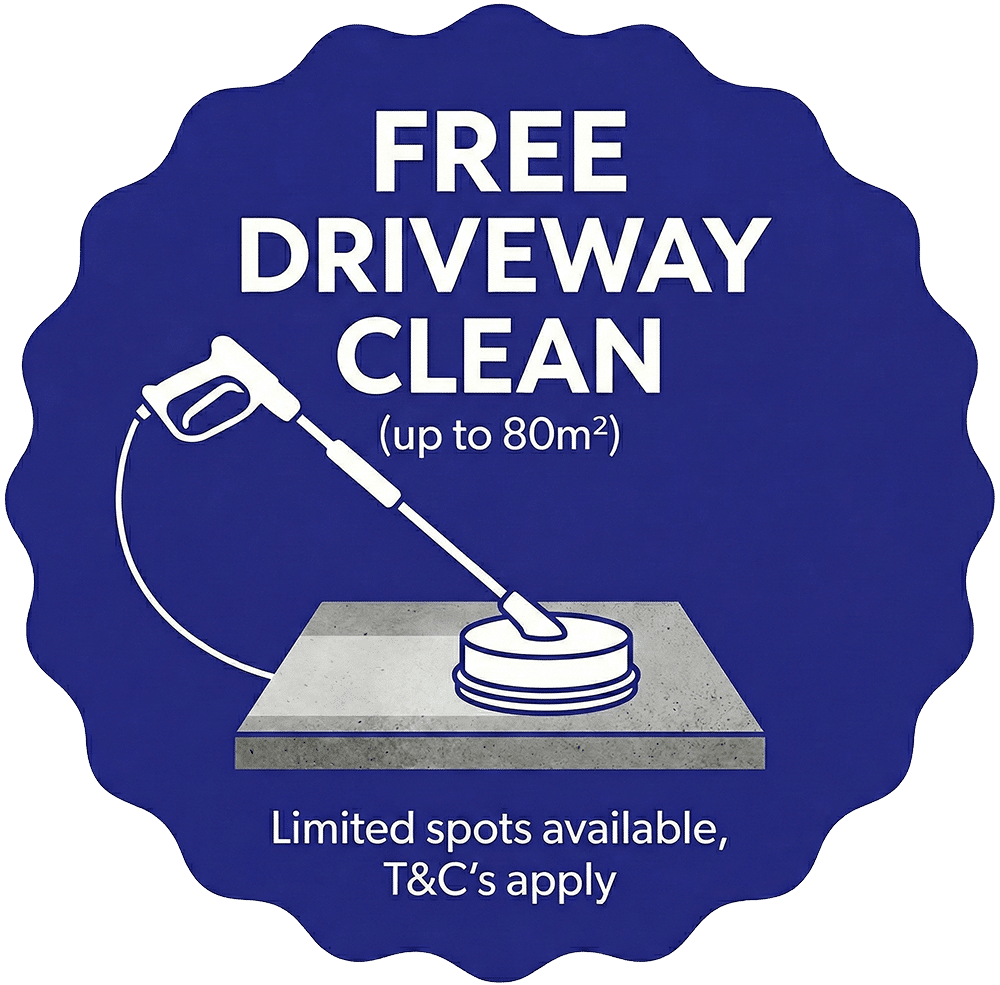Concrete driveways can handle heavy vehicles, constant foot traffic, and tough weather conditions. They still need regular cleaning to look their best. Your driveway’s surface might wear down too early without proper care. This leads to repairs that can get pricey or force you to replace the entire driveway. Clean driveways look great and prevent damage from dirt, grime, and oil stains.
Sunshine Coast’s climate creates special challenges when cleaning concrete driveways. You can try different methods to clean your driveway – from basic sweeping to pressure washing. Professional cleaners employ specialised equipment that works better and faster than home cleaning methods. A sealed driveway after cleaning adds protection against water damage and mould. This ended up making your driveway last longer and saves you money.
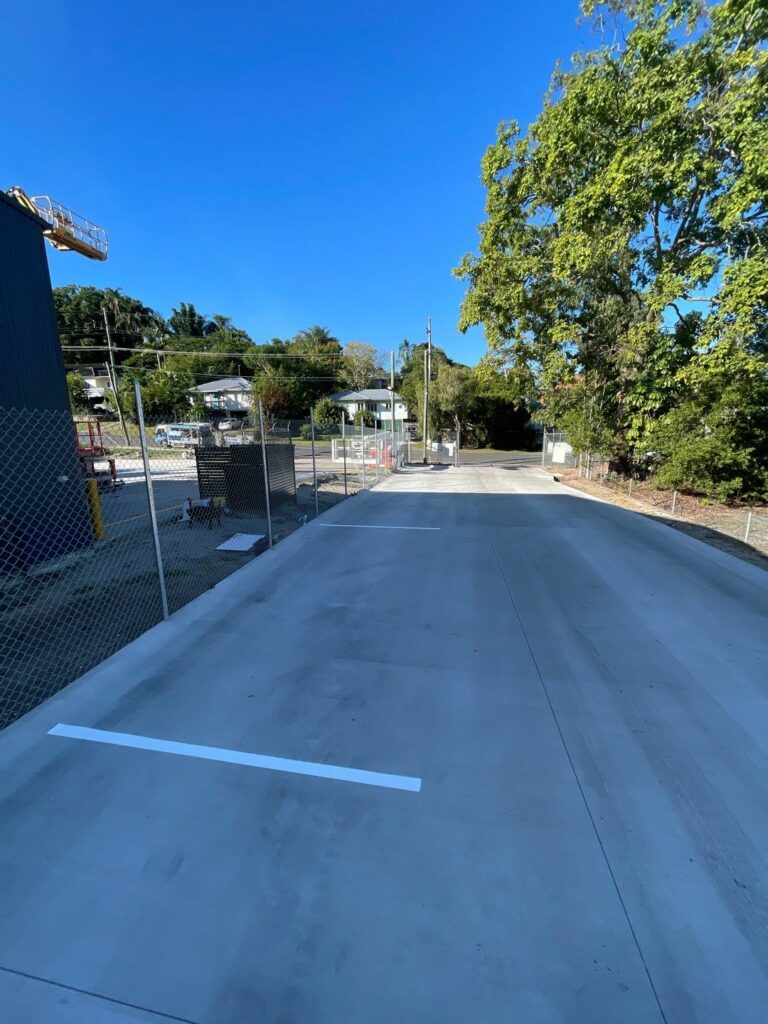
Understanding Your Concrete Driveway
You should know what makes up your concrete driveway and how it reacts to different cleaning methods before you start cleaning it. Your concrete surface’s makeup and finish will determine which cleaning techniques work best.
Types of concrete surfaces and finishes
Each style of concrete driveway needs its own maintenance approach:
- Plain concrete is still the most common and tough option that can last 25-50 years with proper care. This classic gray surface gives you great durability without fancy decorative elements.
- Exposed aggregate shows off decorative stones by removing the top concrete layer. This creates a textured, non-slip surface that people love around their pools. It looks like natural marble or granite.
- Permeable concrete uses bigger stones without the smaller particles like sand to create void networks. This eco-friendly option lets water drain through instead of forming puddles on top.
- Brushed/broom finish creates textured grooves by sweeping a broom over drying concrete. This affordable option gives you better grip.
- Stamped concrete combines stamps and colors to create affordable versions of expensive materials like cobblestone, brick, and flagstone.
Your driveway’s finish isn’t just about looks – it plays a big role in how you’ll clean and maintain it.
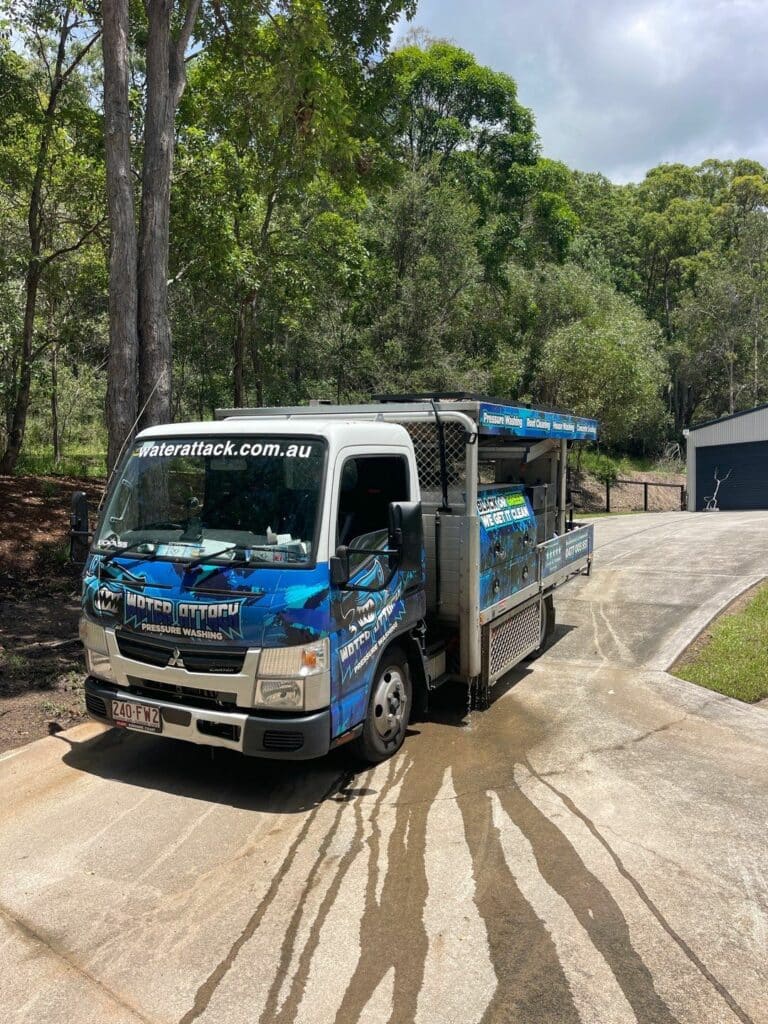
Why porosity matters in cleaning
Concrete naturally has tiny holes that soak up water and contaminants. This makes cleaning both vital and tricky.
These porous properties create several maintenance challenges. The concrete soaks up water vapor during humid weather and moisture from rain and snow. This absorbed moisture can crack the concrete and cause structural damage if you don’t address it properly.
Water getting into concrete leads to common issues:
The moisture can loosen the aggregate and create small cracks where pieces flake off the surface. Water might also rust steel reinforcement bars, which expand and damage the concrete further. Warm weather mixed with moisture creates perfect conditions where mold and mildew can grow.
You need to think about how porous your concrete is when planning to clean it. Very absorbent surfaces need gentle cleaning so dirt doesn’t get pushed deeper into the pores. The right cleaning methods based on porosity will keep your concrete strong while getting rid of surface dirt.
Common issues in Sunshine Coast climate
Concrete driveways face unique challenges in the Sunshine Coast’s subtropical climate. High humidity, heavy seasonal rain, and strong sunshine all affect how long concrete lasts and how you need to clean it.
Driveways in this area often get mold and mildew because of the high humidity. These warm, wet conditions help biological growth thrive, which can turn your driveway black and make it slippery.
Local concrete experts say Sunshine Coast driveways often show rust stains, surface scratches, and bubbling. Concrete is very tough, but it will break down in this climate if you don’t maintain it properly.
Dirt, oil, and chemicals can also sink into the surface and speed up damage in this climate. Local professional cleaners point out that concrete driveways are big investments that can cost “tens of thousands of dollars for residential properties”.
Knowing these local challenges helps you create the right cleaning routine. The best way to clean concrete driveways here involves regular upkeep that matches your specific finish and tackles the unique problems caused by Sunshine Coast weather.
Best Ways to Clean a Concrete Driveway
A clean concrete driveway does more than look good—it lasts longer and adds value to your property. The right tools and techniques can turn your stained, dirty driveway into a spotless surface that makes your home stand out.
1. Regular sweeping and rinsing
Simple regular sweeping creates the most effective maintenance routine. Your driveway stays cleaner and looks better when you sweep it often. Sunshine Coast homeowners should remove fallen leaves and debris, especially during autumn. This prevents stains and clogging.
A good rinse with your garden hose after sweeping gets rid of surface dirt and stops stains from setting. Most fresh spills come right off with a quick spray. Make this a weekly habit and you won’t need intensive cleaning later.
Quick cleanup of oil, grease, and other spills prevents your concrete surface from getting discolored and damaged. This matters even more in Sunshine Coast’s warm climate where stains set faster.
2. Using a pressure washer effectively
Pressure washing gives you the deepest clean. Australian homeowners need to pressure wash their concrete driveways once a year at least. A pressure washer rated between 3,000-4,000 PSI works best. This power level removes tough dirt and stains effectively.
Good equipment makes a big difference. Your pressure washer should have a water flow rate of at least 2.3 GPM (gallons per minute) for efficient cleaning. A 25-degree nozzle works great for general cleaning, while a 15-degree nozzle tackles stubborn stains better.
Clean from top to bottom so dirty water doesn’t flow over clean areas. Work on small 10×10 foot sections. Apply cleaning solution first, then rinse for best results.
3. Eco-friendly cleaning solutions
You can find effective and safe environmentally friendly options. Simple Green Oxy Solve Concrete and Driveway Cleaner uses peroxide to lift stains naturally without harsh chemicals. This product removes tough oil stains, rust stains, grease, tyre marks, and exhaust buildup while protecting surrounding plants and wildlife.
Orange oil-based cleaners cut through grease and grime really well too. These biodegradable solutions protect Sunshine Coast’s delicate ecosystem and still clean powerfully.
Warm water mixed with mild detergent works great for basic cleaning needs. This simple solution works perfectly between deeper cleanings.
4. When to use chemical cleaners
Tough stains sometimes need stronger solutions. Let suitable detergent or stain remover sit on difficult stains like oil, grease, or algae for a few minutes. This makes them easier to remove during pressure cleaning.
A thorough high-pressure rinse removes all chemical residue after cleaning. Left-behind chemicals might damage your concrete surface or harm nearby plants.
Specialised degreasers work best on deep oil spots. Test any chemical cleaner on a small hidden area first to check for discolouration.
5. How to clean driveway with pressure washer safely
Your safety comes first when using a pressure washer. Always wear:
- Long pants and rubber-soled shoes
- Safety goggles and gloves
- Ear protection (for louder gas-powered models)
Start with low pressure and test a small area. Move the spray handle side to side across your driveway. Overlap each pass by about half a foot. Point the pressure washer down and never at yourself or others.
Keep electrical cords away from water. Never use gasoline-powered pressure washers in enclosed spaces because of carbon monoxide risks. Remove toys, vehicles, and debris from the area before starting.
These cleaning methods will keep your concrete driveway looking great and structurally sound in Sunshine Coast’s unique climate.
How to Remove Common Stains from Concrete
Stubborn stains can make your clean concrete driveway look neglected. The good news is you can tackle common concrete stains without expensive professional services if you use the right techniques and products.
Oil and grease stains
Vehicle oil and grease stains are the most common driveway eyesores. You can remove fresh spills by absorbing excess oil with cat litter, sawdust, or baking soda. Let it sit for 30-60 minutes and sweep it away.
Here’s a proven method for stubborn oil stains:
- Apply laundry detergent directly to the stain, adding water to create a paste
- Cover with plastic wrap and secure with tape
- Let sit overnight
- Scrub with a stiff brush and rinse well
You can also use a commercial degreaser like CLR Oil And Grease Remover that you’ll find at Sunshine Coast hardware stores. Just apply the degreaser, wait 1-3 minutes, and scrub with a stiff brush.
Tyre marks and rubber residue
Rubber compounds in tyres soften and transfer to concrete, leaving marks. You can remove them by applying a concrete degreaser directly to the marks. Keep it wet for about 30 minutes. Scrub with a stiff straw brush, add more degreaser, then wash away with a pressure washer.
Automotive brake cleaner works surprisingly well on tough marks. Many Sunshine Coast contractors use this as their secret weapon.
Mould and mildew buildup
Mould and mildew are constant problems in the humid Sunshine Coast climate. Mix one cup of bleach with one gallon of water, spray it on the affected area, and scrub with a stiff brush.
White vinegar mixed with equal parts water makes an effective natural solution for eco-conscious homeowners. Spray it generously, wait 30 minutes, then scrub and rinse.
Rust and mineral stains
Metal furniture, fertilisers, or bore water often leave rust stains on Sunshine Coast driveways. Light stains often come off with lemon juice or white vinegar applied directly. Let it sit for 10 minutes, scrub, and rinse.
A commercial rust remover with oxalic acid works best on stubborn rust stains. Always test acid-based cleaners on a small hidden area first.
Food and beverage spills
You can clean fresh coffee, wine, and food stains with warm soapy water and a good rinse.
Older beverage stains might need a glycerol solution (one part glycerol to four parts water). Apply it as a poultice, cover, and wait 24 hours before rinsing.
Concrete’s porous nature means stains sink in quickly, so quick action gives the best results. A sealed concrete driveway has a protective barrier that makes future stain removal easier.
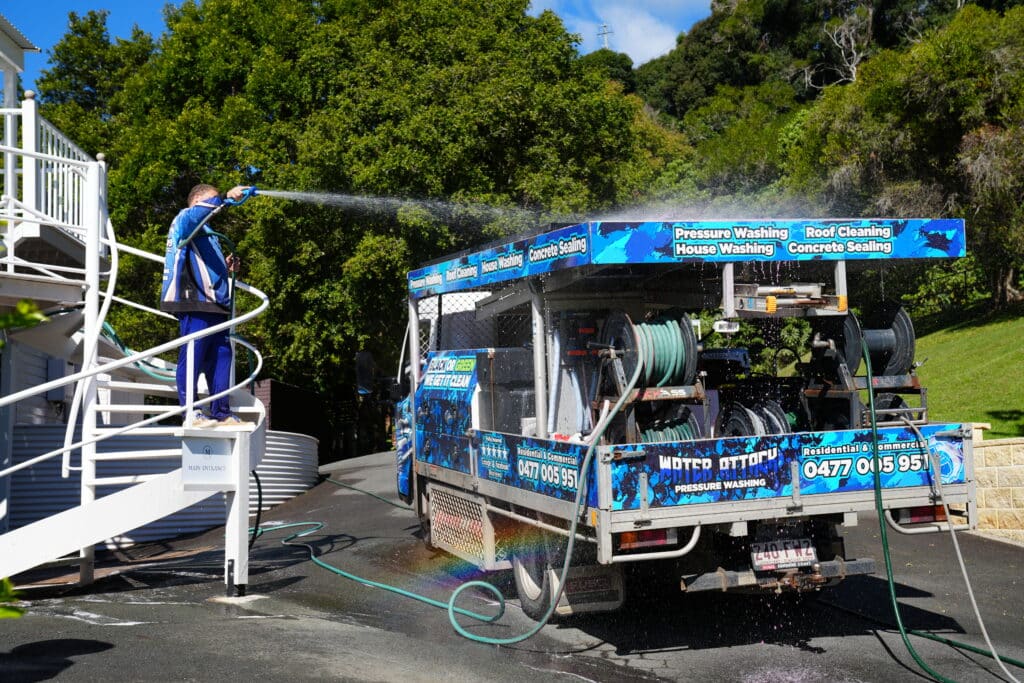
Sealing and Protecting Your Driveway
A quality sealer protects your concrete driveway after cleaning and proves to be a smart investment that pays off for years. The protection lasts much longer than just cleaning alone and defends against future damage.
Why sealing is important
Sealing does more than just make your driveway look better. The sealer creates a protective barrier between your concrete and the harsh Sunshine Coast weather. This barrier stops moisture from getting in and prevents cracks and deterioration. Your driveway becomes easier to clean because the sealer keeps out oil, grease, and other substances.
The humid Sunshine Coast climate makes driveways prone to mould and algae, but sealed surfaces resist this buildup. The sealer also stops UV rays from discolouring the surface and helps your driveway last longer.
How to test if your driveway needs sealing
You can use a simple “water droplet test” to check if your driveway needs sealing. Just pour some water on your concrete surface and watch what happens. Your concrete still has protection if the water beads up and stays that way for five minutes. You need to apply a new sealer if the water quickly soaks in and spreads to around 5cm in size.
Choosing the right sealer for Sunshine Coast weather
The Sunshine Coast climate works well with several sealer options:
- Acrylic sealers: These affordable options come in glossy and matte finishes and need reapplication every 2-3 years
- Penetrating sealers: They create a chemical barrier without changing how your driveway looks and last 4-5 years between applications
- Water-based sealers: These contain fewer VOCs, making them safer to apply and tough enough to handle Australia’s harsh climate
Matte-finish sealers work best for driveways because glossy surfaces can create dangerous glare and reflection.
DIY vs professional sealing
DIY sealing might seem cheaper at first, but professional application often saves money in the long run. Professional concrete sealing businesses have the right equipment and know-how to do the job properly. DIY projects often require buying expensive equipment and materials that professionals already have.
Professional sealing costs between AUD 38.22 to AUD 53.51 per square meter, though Sunshine Coast prices may vary.
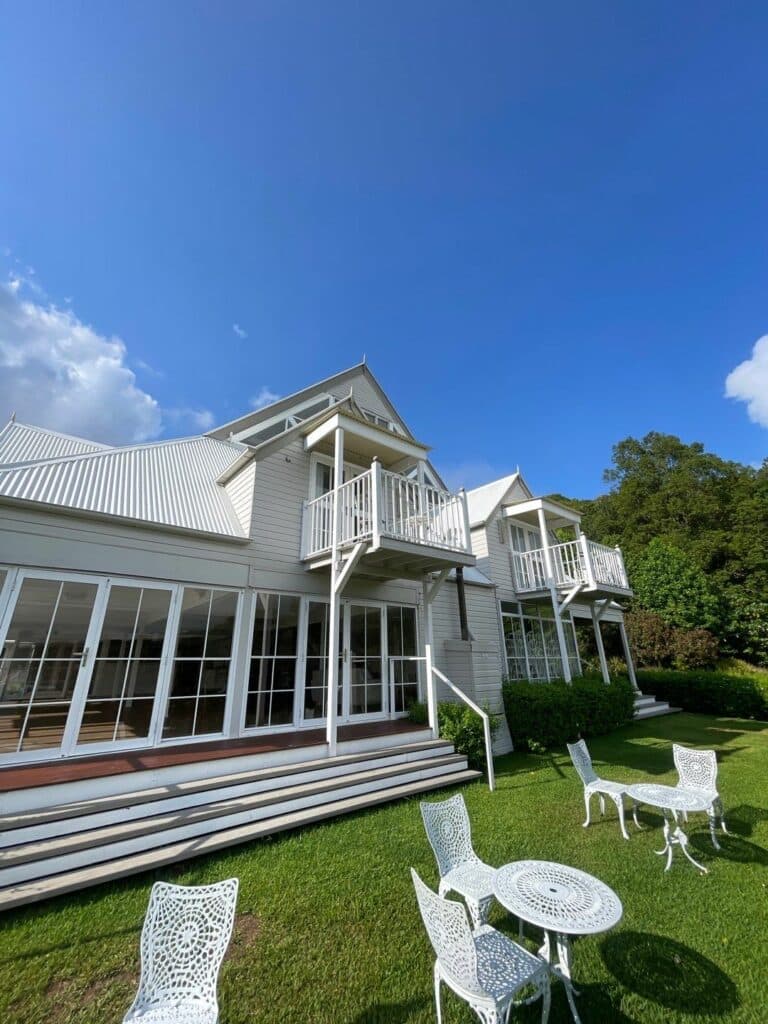
When to Call a Professional Cleaner
DIY cleaning works fine for everyday maintenance, but your concrete driveway sometimes needs professional help. You can save time, money and avoid frustration by knowing when to call the experts.
Signs your driveway needs expert help
Your driveway might be quietly asking for professional help when you notice:
- Stubborn stains that won’t budge no matter how hard you try to clean them, especially when you have deep-set oil, grease, and tyre marks
- Slippery or slimy surfaces suggesting mould and algae growth that creates dangerous conditions after rain
- Major discolouration where your driveway looks dull, dark, or different from its original shade
- Small cracks getting bigger, which could point to problems that need quick attention
Your driveway’s looks can hurt your home’s curb appeal, so professional help might be worth it. A newer study, published in 2023 by experts shows that a well-kept driveway can boost a property’s value by 5-10%.
Benefits of hiring local Sunshine Coast services
Local Sunshine Coast cleaning experts bring unique advantages to the table. They know how to tackle regional challenges like stubborn mould growth in humid weather and use treatments that work best for local conditions. Their specialised hot water pressure cleaning equipment removes tough stains that cold water can’t touch.
The pros apply mould and mildew blockers after cleaning to stop regrowth and make the results last longer. Their knowledge of different concrete surfaces helps them use the right pressure levels and techniques that protect your driveway.
Cost comparison: DIY vs professional
DIY pressure washing looks cheaper at first until you add up equipment costs. A good pressure washer, cleaning solutions, safety gear, and your time are big investments. Professional services charge between AUD $305.80 and $764.50 for a complete exterior wash. This often costs less than buying all the equipment yourself.
What to expect from a professional clean
Professional concrete driveway cleaning services give you peace of mind with a full picture, proper cleaning methods, and satisfaction guarantees. Many Sunshine Coast companies also offer extras like protective sealants or treatments made for local weather.
Good companies give you clear quotes upfront. After they finish, you’ll see a much better-looking driveway that’s safer without mould and will last longer.
Conclusion
Your concrete driveway needs regular care, especially when you have the Sunshine Coast’s challenging climate. High humidity and intense sunshine speed up wear and tear. Basic maintenance steps like regular sweeping, quick stain removal, and yearly pressure washing are the foundations of good concrete care. The right stain removal techniques help prevent lasting damage and make your driveway last longer.
A clean driveway needs sealing to create a protective barrier against moisture and stains. This step will save you time and money on future upkeep. The Sunshine Coast’s weather patterns make sealing even more important because they create perfect conditions for mould growth and surface damage.
Some stubborn stains won’t go away with DIY cleaning methods – that’s when you need professional help. Expert cleaners have the right equipment and know exactly how to handle local conditions. Your driveway is a big investment that deserves professional attention. Water Attack Pressure Washing can help you deal with tough stains or set up a prevention plan.
Your concrete driveway does more than just serve a purpose – it adds value to your home’s curb appeal. While maintenance takes some work, the results are worth it. A clean, sealed driveway looks great and helps you avoid expensive repairs. Regular care will help your concrete driveway stand strong against the Sunshine Coast’s harsh climate.
FAQs
Q1. What’s the most effective method for cleaning a concrete driveway? A combination of regular sweeping, rinsing, and annual pressure washing works best. For tougher stains, use a mixture of warm water and mild detergent or eco-friendly cleaners. Pressure washing with a 3,000-4,000 PSI machine is highly effective for deep cleaning.
Q2. How can I restore the appearance of my old concrete driveway? Start by thoroughly cleaning the surface with a pressure washer to remove dirt and stains. After cleaning, apply a quality concrete sealer to protect the surface and enhance its appearance. This will help prevent future staining and extend the life of your driveway.
Q3. When should I consider hiring a professional driveway cleaning service? Consider professional help if you notice stubborn stains that won’t budge, significant discolouration, or signs of mould and algae growth. Professionals have specialised equipment and expertise, especially useful for addressing challenges specific to the Sunshine Coast climate.
Q4. How do I remove oil stains from my concrete driveway? For fresh oil stains, absorb excess oil with cat litter or baking soda. For older stains, apply a degreaser or make a paste with laundry detergent and water. Cover the paste with plastic wrap, let it sit overnight, then scrub and rinse thoroughly.
Q5. Is sealing my concrete driveway necessary, and how often should it be done? Sealing is crucial for protecting your driveway from moisture, stains, and UV damage. The frequency depends on the type of sealer used, but generally, reseal every 2-5 years. Perform a water droplet test to determine if resealing is needed – if water quickly absorbs into the concrete, it’s time to reseal.

